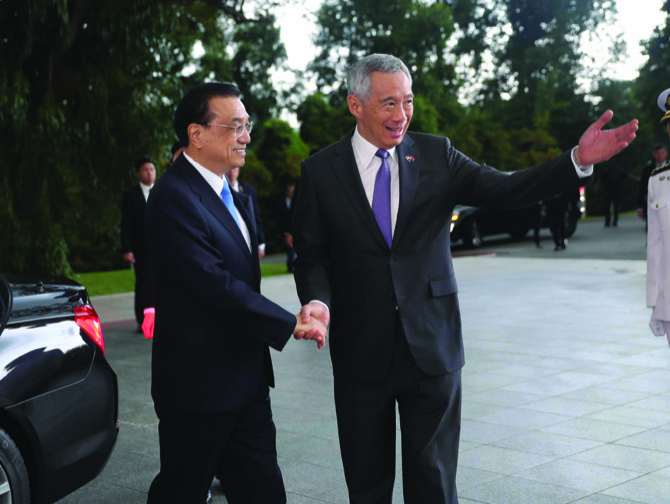
Reuters reports that China will further open its economy in the face of rising protectionism, Premier Li Keqiang said as he arrived in Singapore on Monday for meetings with Asia-Pacific leaders that will focus on speeding up work on a major new trade pact. Li's remarks in an article in Singapore's Straits Times newspaper came as Singapore's Prime Minister Lee Hsien Loong called for more regional integration, saying multilateralism was under threat from political pressures. "China has opened its door to the world; we will never close it but open it even wider," Li said in the article, in which he called for an "open world economy" in the face of "rising protectionism and unilateralism". He did not directly refer to China's bruising trade war with the United States. Notably absent from this week's meetings is U.S. President Donald Trump, who has said several existing multilateral trade deals are unfair, and has railed against China over intellectual property theft, entry barriers to U.S. businesses and a gaping trade deficit.
Bloomberg reports that China's policy makers are expected to increase the budget deficit in the coming year, as a slowing economy and the downdraft from the trade war with the U.S. raise the need for a more active fiscal policy. Authorities will increase the budget deficit target to between 2.6 percent and 3 percent of economic output, up from 2.6 percent this year, according to 21 of 28 economists in a Bloomberg survey. The remainder forecast a deficit higher than 3 percent of gross domestic product. The quota for off-budget government bonds -- used in particular to finance stimulus via infrastructure investment -- will be at least 1.35 trillion yuan ($194 billion) -- the same or higher than this year, the survey showed. China's economy slowed more than expected in the third quarter as a funding squeeze combined with the uncertainty brought about by the trade war with the U.S. While policy makers have taken a series of steps to shore up the expansion, from easier credit policy to multiple cuts to banks' reserve requirement ratios, high debt levels make broad-based stimulus less likely.
- 2018-11-11 Bilateral ties, military movement key points at US-China meeting
- 2018-11-09 Forget the trade war, China's economy has other big problems
- 2018-11-08 Trump’s Tariffs Have Fully Kicked In—Yet China’s Exports Grow
- 2018-11-07 Here's what the US election results mean for Trump's trade war with China
- 2018-11-06 China open to trade talks with US, says Wang Qishan
- 2018-11-05 Xi tells the world China will boost imports while swiping at Trump’s ‘law of the jungle’
- 2018-11-04 Trump-Xi Trade Deal Is Likely to Begin Rather Than End at G-20
- 2018-11-02 Trump and China’s Xi give positive signs over phone call but markets give up early gains
- 2018-11-01 Australia to Rebuild U.S. World War II Base as China Courts Pacific Allies
- 2018-10-31 Taiwan's UMC halts R&D activities with Chinese semiconductor firm after U.S. ban
- Forbes For Some Mining Companies'-- The Trade War Is Looking Like a Phony War
- Financial Times Myanmar tycoon champions $1.5bn China-backed industrial zone
- Forbes Ahead Of Trump-Xi Meeting, Record-Setting Oil Exports To China At Zero For 2nd Month
- Reuters Chinese city reliant on US trade fires official for faking export data
- Reuters China's trade faces more severe, complicated situation in 2019
- Reuters China, HK stocks edge higher as govt ramps up support for private sector
- Wall Street Journal Foreign Buying of Chinese Bonds Slows as Yuan Falls
- Bloomberg China Rate-Cut Chatter Becomes Louder as Growth Risks Gather
- Bloomberg Australia's Morrison Says China-Australia Relations 'Very Stable'
- Bloomberg Navarro Warns Wall Street to Stay Out of China Trade Talks
